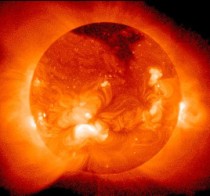-
The Sun is a star found at the center of the Solar System.
-
It makes up around 99.86% of the Solar System’s mass.
-
At around 1,392,000 kilometres (865,000 miles) wide, the Sun’s diameter is about 110 times wider than Earth’s.
-
Around 74% of the Sun’s mass is made up of
hydrogen. Helium makes up around 24% while heavier elements such as
oxygen, carbon, iron and neon make up the remaining percentage.
-
Light from the Sun reaches Earth in around 8 minutes.
-
The Sun’s surface temperature is around 5500
degrees Celsius (9941 degrees Fahrenheit), so pack plenty of sunscreen
if you plan on visiting (remembering that the average distance from the
Sun to the Earth is around 150 million kilometers).
-
The Sun’s core is around 13600000 degrees Celsius!
-
The Sun generates huge amounts of energy by combining hydrogen nuclei into helium. This process is called nuclear fusion.
-
Because of the Sun’s huge influence on Earth, many
early cultures saw the Sun as a deity or god. For example, Ancient
Egyptians had a sun god called Ra while in Aztec mythology there is a
sun god named Tonatiuh.
-
The Sun produces a solar wind which contains
charged particles such as electrons and protons. They escape the Sun’s
intense gravity because of their high kinetic energy and the high
temperature of the Sun’s corona (a type of plasma atmosphere that
extends into space).
-
Planets with strong magnetic fields such as Earth manage to deflect most of these charged particles as they approach.
-
A solar eclipse occurs when the Moon is between the Sun and the Earth.
|
|


No comments:
Post a Comment